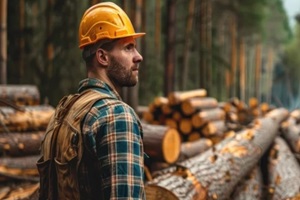
Forestry remains one of the most dangerous work niches in the United States. Workers face the risk of permanent injury, disfigurement, and death. At the same time, companies must also contend with the loss of property valued in the tens or hundreds of thousands of dollars should a tree fall in the wrong place or a fire spread through a work tract.
Forestry equipment insurance is just one piece of the puzzle for protecting these valuable assets and keeping your forestry business safe from harm. New and existing forestry businesses needing insurance policies to cover their operations should work with industry professionals to verify that there are no coverage gaps.
Let’s explore the basics of thorough insurance protection and what to expect when securing your business.
Essential Coverage Components
Each forestry business is unique, and the types of insurance that are right for you will vary depending on which sector your operations target. For instance, logging companies will require different protections for equipment and workers than sawmills.
In general, the basic policies that all forestry companies should include in their coverage are:
Forestry Insurance
It should come as no surprise that businesses in this sector should have an overarching forestry policy. This type of protection can secure your company against losses in the trees they have secured for their work.
Should fire, wind storms, or other events destroy the trees, this insurance can compensate for lost products. Additionally, it may cover instances in which another company mistakenly or maliciously destroys or harvests a tract already claimed by your business.
Forest Equipment Insurance
Forestry equipment is large and costly, meaning that replacing it can be too drastic an expense for a company. If repairs or replacements are needed, equipment insurance can cover the cost so long as the machinery is being used for its intended purpose according to manufacturer instructions.
Liability Insurance

All businesses should have liability insurance, which protects them from the financial and legal consequences of causing damage to someone else’s property or injuring a third party during work. Liability insurance is especially essential in this line of work because of the uncontrolled nature of logging, such as losing control of logs and trees falling in unintended ways.
Business Interruption Insurance
Weather, natural disasters, and other factors can all interfere with scheduling for a forestry company. If your business operations are interrupted, this type of insurance can cover essentials such as corporate rent until you can return to work.
Workers’ Compensation Insurance
In a dangerous industry, such as forestry, workers’ compensation insurance is non-negotiable. This type of protection can cover medical bills, rehab costs, and even family payouts if one of your employees is injured or killed on the job.
Be sure to read the fine print of your policy—in the forestry industry, policy exclusions can limit coverage. For example, thumb amputation is fairly common among forestry industries, but baseline workers’ comp policies may not pay out for finger amputations of less than three fingers.
Additional Policies to Consider
Depending on the scope of your work and budgetary constraints for insurance coverage, other types of protection may also be worthwhile. These include, among others:
Pollution Insurance
The oil, diesel, and gasoline that power your company’s heavy machinery can significantly impact the environment. If your equipment leaks or causes pollution while working in nature, your company is typically responsible for the cost of remediating the area. Pollution insurance can cover these costs so you can return to work without a significant financial downturn.
Inland Marine Insurance

The equipment used in forestry must travel long distances and is often left on-site overnight. This exposes it to transportation risks and the threat of theft, vandalism, damage by fire, and more.
Inland marine insurance can secure your heavy machinery against risks in transit or on-site, depending on the scope of the policy. In general, inland marine addresses risks outside your primary business location. At the same time, property insurance covers perils that arise on-site at your business.
Secure Your Forestry Business With Equipment Insurance By Burton & Company
Securing your forestry business against the financial and legal consequences of field damage, theft, and more should stay at the top of your priority list when investing in your company’s future. Forestry is a dangerous niche, not just for workers but for your physical assets.
The experts at Burton & Company have extensive experience with helping businesses navigate the unique insurance challenges posed by the forestry industry. Contact Burton & Company for a personalized consultation that offers a customized insurance package customized to your operation’s risks and budgetary constraints.

